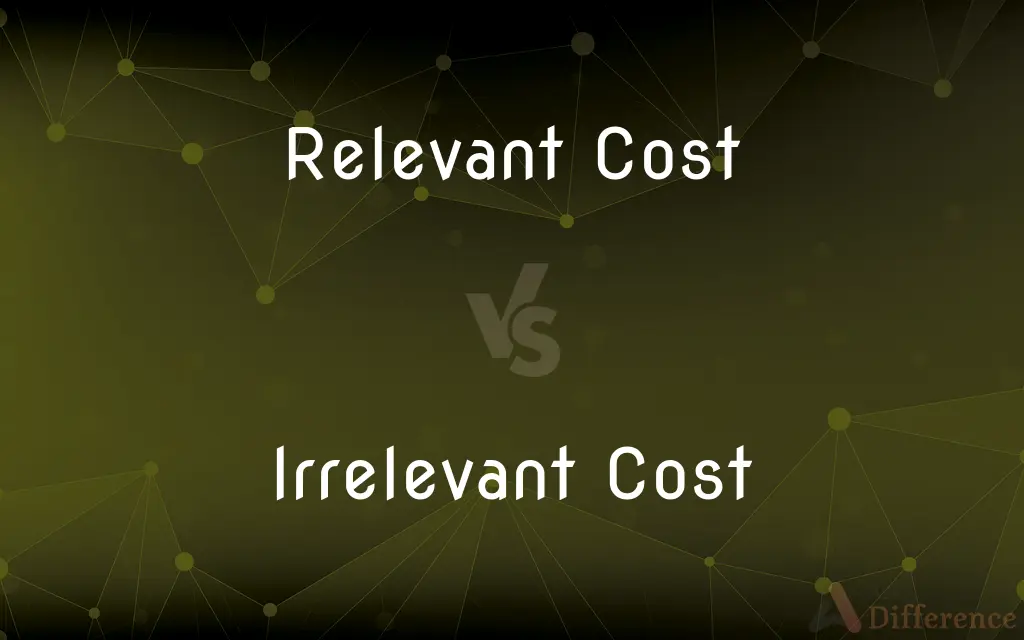Relevant Cost vs. Irrelevant Cost — What's the Difference?
By Tayyaba Rehman — Published on January 15, 2024
Relevant Cost affects a specific business decision, while Irrelevant Cost doesn't impact the decision-making process.

Difference Between Relevant Cost and Irrelevant Cost
Table of Contents
ADVERTISEMENT
Key Differences
Relevant Cost and Irrelevant Cost are two financial terms vital in the decision-making process of businesses. Relevant Cost refers to costs that will be affected by a specific business decision. It's the cost that changes if the decision changes. Irrelevant Cost, on the other hand, remains unchanged regardless of the decision made.
Understanding both Relevant Cost and Irrelevant Cost is crucial for businesses to make informed and efficient decisions. While Relevant Cost can influence a choice due to its direct impact on profitability or expenses, Irrelevant Cost remains consistent, not swaying the decision one way or the other.
For instance, if a company is deciding whether to continue or discontinue a product line, the costs directly associated with that product line (like materials or direct labor) are Relevant Costs. Meanwhile, costs like company-wide administrative salaries, which won't change whether the product line continues or not, are considered Irrelevant Costs.
In a scenario where a company is contemplating purchasing new machinery, the cost of the new machine and changes in operational costs are Relevant Costs. However, the book value of the old machine, which won't impact the decision, is an Irrelevant Cost. Therefore, businesses should emphasize Relevant Costs and set aside Irrelevant Costs when strategizing for financial decisions.
Lastly, it's essential to note that what may be a Relevant Cost in one situation might be an Irrelevant Cost in another. The context of the decision at hand determines the relevance or irrelevance of a cost.
ADVERTISEMENT
Comparison Chart
Nature
Affected by a specific decision
Not affected by the decision
Impact on Decision
Influences decision-making
Does not influence decision-making
Example
Costs of materials for a new product
Book value of old machinery
Flexibility
Can change based on the context of decision
Remains consistent regardless of the decision
Application
Used in decision-making processes
Set aside during decision-making processes
Compare with Definitions
Relevant Cost
Costs that influence a specific business decision.
The expense of materials needed for a new product launch is a Relevant Cost.
Irrelevant Cost
Costs that don't vary among alternatives.
When choosing a new supplier, the previous year's supplier cost is an Irrelevant Cost.
Relevant Cost
Costs considered when evaluating business strategies.
When deciding to expand, the rental cost of new office space is a Relevant Cost.
Irrelevant Cost
Expenditures that don't impact decision-making.
A company's historical marketing costs are Irrelevant Costs for future campaigns.
Relevant Cost
Expenditures that change based on a decision's outcome.
Opting for an advertising campaign would introduce a Relevant Cost for that campaign.
Irrelevant Cost
Costs that remain unchanged regardless of a decision.
The initial cost of a piece of machinery is an Irrelevant Cost when deciding to replace it.
Relevant Cost
Directly associated with a business choice.
If contemplating discontinuing a product, its direct labor cost becomes a Relevant Cost.
Irrelevant Cost
Costs not directly associated with a specific business choice.
Company-wide administrative salaries are often Irrelevant Costs in product-specific decisions.
Relevant Cost
Future costs that vary among alternatives.
Choosing between suppliers might bring different material costs, making them Relevant Costs.
Irrelevant Cost
Sunk costs which have already been incurred.
Money spent on research for a discontinued project is an Irrelevant Cost for future projects.
Common Curiosities
Can the book value of an asset be a Relevant Cost?
Typically, the book value of an asset is an Irrelevant Cost when deciding to replace or upgrade it.
Are future costs always Relevant Costs?
Future costs are Relevant if they vary among decision alternatives; otherwise, they might be Irrelevant.
How does Relevant Cost differ from Irrelevant Cost in decision-making?
Relevant Cost influences decisions as it changes based on choices, while Irrelevant Cost remains unchanged and doesn't sway decisions.
Why is it essential to identify Relevant Costs in business?
Identifying Relevant Costs ensures businesses make decisions based on costs that will be directly affected, optimizing profitability.
What role does context play in determining Relevant and Irrelevant Costs?
The context of the decision at hand is crucial. Costs that are Relevant in one scenario might be Irrelevant in another.
Are sunk costs considered Relevant or Irrelevant Costs?
Sunk costs are typically considered Irrelevant Costs since they've already been incurred and don't affect future decisions.
Can administrative costs ever be Relevant Costs?
Yes, if administrative costs change based on a decision, they become Relevant Costs.
How do businesses benefit from distinguishing between Relevant and Irrelevant Costs?
By focusing on Relevant Costs, businesses can make more informed and efficient decisions, ensuring resources aren't wasted on Irrelevant Costs.
Why are Irrelevant Costs sometimes considered in decision-making processes?
While they shouldn't influence decisions, they're sometimes considered due to misconceptions or lack of clarity in the decision-making process.
Can a cost be both Relevant and Irrelevant?
Yes, a cost might be Relevant in one context and Irrelevant in another based on the specific decision.
What’s a common example of an Irrelevant Cost in manufacturing?
The initial cost of machinery is often an Irrelevant Cost when deciding on maintenance or replacement.
Are all variable costs Relevant Costs?
Not necessarily. While variable costs often change with production levels, they're only Relevant if they change among decision alternatives.
Are fixed costs always Irrelevant Costs?
Not always. Fixed costs can be Relevant if they're incurred due to a specific decision.
Share Your Discovery

Previous Comparison
DROP in SQL vs. TRUNCATE in SQL
Next Comparison
Leasehold vs. FreeholdAuthor Spotlight
Written by
Tayyaba RehmanTayyaba Rehman is a distinguished writer, currently serving as a primary contributor to askdifference.com. As a researcher in semantics and etymology, Tayyaba's passion for the complexity of languages and their distinctions has found a perfect home on the platform. Tayyaba delves into the intricacies of language, distinguishing between commonly confused words and phrases, thereby providing clarity for readers worldwide.












































